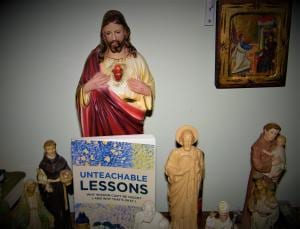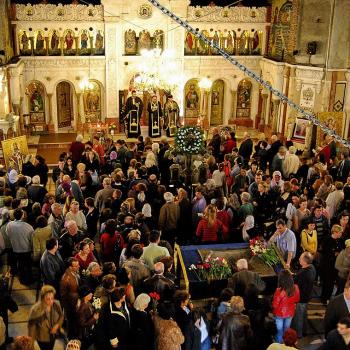Unteachable Lessons: Why Wisdom Can’t Be Taught (And Why That’s Okay) by Carl McColman (Grand Rapids, MI: William B. Erdman’s Publishing Company, 2019), 163+x pages.

How do we love, how do we trust others (including, and especially God), how, indeed, do we reach out to others, showing them our compassion and love, without appearing narcissistic, nor while neglecting our own proper needs? It’s easy to give some nice, simple advice, but what we need is prudential wisdom, wisdom which cannot be dictated but can only be earned through experience.
Theoretical knowledge can be useful; people can offer us various maps which present to us possible ways to gain wisdom, but we need more than that; we must do more than contemplate and think about good things, we must experience them, and we experience them through the ups and downs of our lives. Then, we realize from doing and not just thinking about the wisdom which we seek, wisdom which no one can give us, though they can in various ways help us as catalysts in order to get it. No one can teach us how to love. No one can teach us how to trust. No one can teach what the experience of God is like without having that experience ourselves. But they can show us the way through their own experiences. They can offer us hope. They can inspire us to seek after wisdom for ourselves by showing how they have attained some of it for themselves. This, in a fashion, can serve as a summary of what one can expect from Carl McColman’s newest book, Unteachable Lessons.
Carl McColman is honest, very honest, about himself, making himself vulnerable to his readers by showing both the caring heart and desires which have motivated him throughout his life, but also by relating to us his own weaknesses and failures to deal with the people around him, including and especially loved ones in his family. It is often through our failures, through our imperfections, through our weaknesses that we are able to grow and become better, indeed, to attain some level of wisdom; nonetheless, this is true only if we let ourselves go and accept our faults and weaknesses for what they are and seek to find the grace necessary to transcend ourselves and what we often thought we knew or understood. Carl, in his heartbreaking reflection on his relationship with his adopted daughter, Rhiannon, shows how he was able to see and understand his imperfections, his “Charlie Babbitt” as he put it, his qualities which held him back from loving and trusting others, and in the process, to move beyond himself, not necessarily perfectly but by allowing himself to be put in the process of being transformed to becoming a better person, the person one could say God intends him to be. The lesson he learned is one which, despite differences in our own situations, we can understand and learn from because we should be able to see similarities to our own life. It might not be we faced the same problems he face, but we can all reflect upon our lives, and the times which we did not always act in the best possible ways to our loved ones.
We must, as Carl says in another chapter, learn wisdom by “feeling it in our bones.” That is, we must accept wisdom comes to us holistically, that we can experience and feel it coming from within and not just achieved through an act of reason (like a Vulcan). Certainly, there is an intellectual side to wisdom, but it transcends human reason and we experience it through our emotions, through our bodies, through our whole being. We have lost track of the holistic nature of wisdom by trying to turn it into a purely intellectual enterprise, thinking wisdom can be given to others in the same way mathematical principles can be taught. Nonetheless, we must not think it is anti-intellectual, that is, we must not think we can attain wisdom without intellectual reflection. It requires both. Because there is an intellectual element, we can and should share with each other what we have learned; it becomes an important part of how we engage wisdom and gain more of it; the only problem is when we reduce it to a purely intellectual enterprise which can be put down in words. We must, as Carl explains in his book, go beyond words and even embrace that which often is hard for us to embrace in the modern world: silence. Carl doesn’t suggest he is a great practitioner of silence: indeed, he says it can be as difficult for him to engage as it is for the rest of it, but yet he has had times in which he gained much insight, much grace, when he silenced himself and just sought the peace found in silence. What he learned is that, even when we have noise all around us, all kinds of distraction which come to us when we try to pray and meditate in silence, the silence is there, it has always been there and always be there, and that means we can and should be able to encounter it and gain something from that encounter:
Silence was always there.
In other words, even when my inner voice was chattering away as loud as can be, it’s not as if silence had left the building (or me). Rather, silence simply hung out in the background while I kept distracting myself with whatever hit song I was humming to myself or whatever argument I was having with this or that coworker, or whatever other idea or feeling or story line I kept repeating within (61).
One of the difficulties of prayer, of silent meditation, is that our mind is often distracted, incapable of attaining silence for any length of time. Yet, we might be able to experience such silence and encounter its mysterious grace for a second. Or two seconds. Or three. Or a minute. Some days we might do better than others. But each time we do so, what Carl describes is true: we do not create the silence, we enter it, a silence which is all around us and with us, a silence which brings us into the great majestic presence of God, allowing us to experience the Shalom of God. Carl can tell us about his experience of this; we can intellectually and rationalistically perceive what he says sounds to be true, but until we experience it, until we put the practice of silence into our lives, we will never truly know it from within, within our bones. This is exactly the kind of unteachable lesson which Carl brings to us; if we have read many books on spirituality we might know this in theory, but until we actually engage silence ourselves, until we silence our minds (through prayer and meditation) and seek God in that silence, we will never know the value of silence nor how that encounter with silence can demonstrate to us how many things can be present to us, always present to us, even when we are unaware (including but especially God).
It is, therefore, through stories, stories of his own life, we are told about the lessons which Carl has learned, and through them, we are shown a way in which we, too, can begin to learn and gain wisdom for ourselves. The same reason why we love to read stories of the saints, from the desert fathers to modern workers of social justice like Dorothy Day, should be the same reason why we should seek storytellers like Carl McColman; we learn from them, not just because of the holiness which they achieved, but because we see through them the process of such holiness is rarely simple and without mistakes. We are often inspired when we see people change for the better, especially if we see through their changes way we too can be changed.
Dorothy Day inspires many of us today because she was a very human saint, a woman who sought after truth and justice, but in doing so, made many grave mistakes along the way, getting better, getting wiser because she did not let those mistakes drag her down. Likewise, Carl is honest with us with his own spiritual journey. It is one which has not come to an end. He is still learning, but one thing he has learned is how to accept the whole of that journey. He is now a Catholic, but the process of becoming Catholic took him through many other faith traditions, Christian and non-Christian alike. Instead of repudiating that journey or what he gained from his previous faith traditions, such as his engagement with Wicca, Carl wisely points out that even then, there was much which he learned and gained which remain with him today. Christians need not fear the lessons they can gain from others, including and especially non-Christian religious traditions: indeed, in the history of Christianity, Christians have always been learning from and gaining from non-Christian wisdom (such as early Christians looking to Plato and the Platonists, or the schoolmen with Aristotle and his interpreters). Just as silence is always with us, even when our mind is not silent, so God is with us and all of humanity, guiding it, directing it, and as Nostra Aetate indicated, what is good and true of other religions should not rejected but rather seen as a representation of the light of truth shining throughout the world. For many of us, the Christian faith requires us to engage other faiths, to see the light of truth within them, and to have an internal dialogue based upon what we already know from revelation and doctrine with the wisdom other faiths can give to us. That is, we will have an “intra-religious dialogue” as Raimon Panikkar put it. We might not always recognize we are having it; we might not be like Carl, going from one religious tradition to another, but if we are honest with ourselves, our contact with the world at large, with scientists, philosophers, and practitioners of other faith traditions, we are learning from them, taking in what we learn and incorporating it into our own beliefs and practices. It is in this light that Carl’s chapter, “Pagans and Druids and Buddhists – Oh My!” might be one of the most important chapters of this little book, because it shows how and why the intrareligious dialogue is invaluable as it directs us further to the wisdom which we seek after all our lives. Instead of being harsh and negative about ourselves and the paths which we have taken to gain wisdom, we can and should appreciate what we have learned from those paths, even if we sometimes have to depart from one path and join another.
As has been already mentioned, Carl reminds us throughout his book, but also at the very end, the need for a combination of the heart and the intellect, as he points out in his epilogue how this relates to the religious quest as a whole. That is, there are two great mistakes, one which leads to a dry, intellectual doctrinal rigorism without spiritual depth, and the other a spirituality which isolates us from everyone and becomes bound by its own narcissism:
Spiritually speaking, when we make the first mistake, we settle for a religion of dogma and ritual but no living spiritual heart. But when we make the second mistake, we become spiritual narcissists, refusing to integrate our own spiritual life with the shared wisdom and experience of all who have gone before us (155).
Carl knows he cannot teach us how to think, or how to feel, or how to have a healthy spirituality. We can only do such things for ourselves. But he shares with us his own experiences, and what he has gained, so that we can begin to see for ourselves how to gain the wisdom which we also need. He offers a good, important, text for those needing to overcome themselves, to be reminded that the wisdom is always there and can be realized by us all, even when we find ourselves in the midst of a life filled with many ups and downs.
Stay in touch! Like A Little Bit of Nothing on Facebook.
If you liked what you read, please consider sharing it with your friends and family!
















